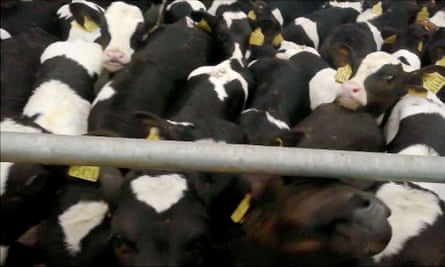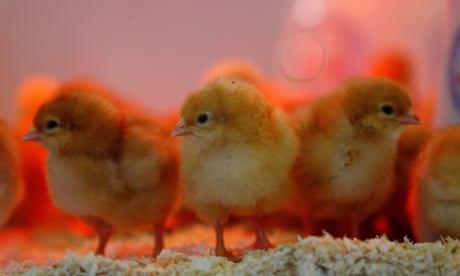Environment secretary hails ‘Brexit success’ for animal welfare, but poultry to be excluded and Northern Ireland exempted

An estimated 6,400 animals were sent to Europe for slaughter in 2018. Photograph: Eyes on Animals
Animals farmed is supported by

Sophie Kevany
Wed 2 Dec 2020
Plans to ban the export of live animals for slaughter and fattening are to be unveiled by the UK’s environment secretary, George Eustice, on Thursday.
The Department for Environment, Food and Rural Affairs (Defra) said the plans were part of a renewed push to strengthen Britain’s position as a world leader on animal welfare.
An estimated 6,400 animals were sent to Europe for slaughter in 2018, according to Defra. Many of those left through the port of Ramsgate in Kent.
“Live animals commonly have to endure excessively long journeys during exports, causing distress and injury. Previously, EU rules prevented any changes to these journeys, but leaving the EU has enabled the UK government to pursue these plans,” Defra said.
The eventual ban would be considered a Brexit success, seeing Britain become the first country in Europe to end this practice.
The beginning of a joint eight-week consultation in England and Wales would mark “a major step forward in delivering on our manifesto commitment to end live exports for slaughter”, said Eustice. “Now that we have left the EU, we have an opportunity to end this unnecessary practice. We want to ensure that animals are spared stress prior to slaughter.”

Exclusive: livestock ships twice as likely to be lost as cargo vessels
It is understood from a UK government source that the joint consultation will be used as the basis for discussions with Scotland. Those discussions, and the consultation findings, will then be used to examine ways of harmonising the ban.
However, live exports look set to continue in Northern Ireland which “will continue to follow EU legislation on animal welfare in transport for as long as the Northern Ireland protocol is in place”, according to Defra.
Poultry exports also appear set to continue, Defra added: “The measure on live exports will not impact on poultry exports or exports for breeding purposes.” The UK currently exports tens of millions of chicks a year in an industry that was worth £139m in 2018.

UK's trade in breeding chicks may not be covered by planned live export 'ban'
Asked if the eventual ban might be an achievement that could be credited to the prime minister Boris Johnson’s partner, Carrie Symonds, the source would not comment. Symonds is a patron of the Conservative Animal Welfare Foundation (CAWF) which has long lobbied for an end to live exports.
“We are hoping this consultation will lead to an end to live exports for slaughter and fattening, which has caused such enormous suffering, by 2022 or even next year,” said CAWF’s founder, Lorraine Platt. The foundation sent its latest research report on ending live exports to the UK government several weeks ago.
Compassion in World Farming’s chief policy adviser, Peter Stevenson, said the organisation was “delighted that Defra plans to ban live exports for slaughter and fattening. We have campaigned for over 50 years against the massive suffering caused by this inhumane, archaic trade, so this unambiguous proposal is very welcome.”
The RSPCA’s CEO, Chris Sherwood, was equally welcoming and said he looked “forward to seeing this happen as the RSPCA has campaigned on this issue for more than 50 years”
Animals farmed is supported by

Sophie Kevany
Wed 2 Dec 2020
Plans to ban the export of live animals for slaughter and fattening are to be unveiled by the UK’s environment secretary, George Eustice, on Thursday.
The Department for Environment, Food and Rural Affairs (Defra) said the plans were part of a renewed push to strengthen Britain’s position as a world leader on animal welfare.
An estimated 6,400 animals were sent to Europe for slaughter in 2018, according to Defra. Many of those left through the port of Ramsgate in Kent.
“Live animals commonly have to endure excessively long journeys during exports, causing distress and injury. Previously, EU rules prevented any changes to these journeys, but leaving the EU has enabled the UK government to pursue these plans,” Defra said.
The eventual ban would be considered a Brexit success, seeing Britain become the first country in Europe to end this practice.
The beginning of a joint eight-week consultation in England and Wales would mark “a major step forward in delivering on our manifesto commitment to end live exports for slaughter”, said Eustice. “Now that we have left the EU, we have an opportunity to end this unnecessary practice. We want to ensure that animals are spared stress prior to slaughter.”

Exclusive: livestock ships twice as likely to be lost as cargo vessels
It is understood from a UK government source that the joint consultation will be used as the basis for discussions with Scotland. Those discussions, and the consultation findings, will then be used to examine ways of harmonising the ban.
However, live exports look set to continue in Northern Ireland which “will continue to follow EU legislation on animal welfare in transport for as long as the Northern Ireland protocol is in place”, according to Defra.
Poultry exports also appear set to continue, Defra added: “The measure on live exports will not impact on poultry exports or exports for breeding purposes.” The UK currently exports tens of millions of chicks a year in an industry that was worth £139m in 2018.

UK's trade in breeding chicks may not be covered by planned live export 'ban'
Asked if the eventual ban might be an achievement that could be credited to the prime minister Boris Johnson’s partner, Carrie Symonds, the source would not comment. Symonds is a patron of the Conservative Animal Welfare Foundation (CAWF) which has long lobbied for an end to live exports.
“We are hoping this consultation will lead to an end to live exports for slaughter and fattening, which has caused such enormous suffering, by 2022 or even next year,” said CAWF’s founder, Lorraine Platt. The foundation sent its latest research report on ending live exports to the UK government several weeks ago.
Compassion in World Farming’s chief policy adviser, Peter Stevenson, said the organisation was “delighted that Defra plans to ban live exports for slaughter and fattening. We have campaigned for over 50 years against the massive suffering caused by this inhumane, archaic trade, so this unambiguous proposal is very welcome.”
The RSPCA’s CEO, Chris Sherwood, was equally welcoming and said he looked “forward to seeing this happen as the RSPCA has campaigned on this issue for more than 50 years”
No comments:
Post a Comment